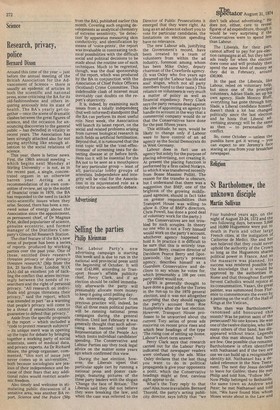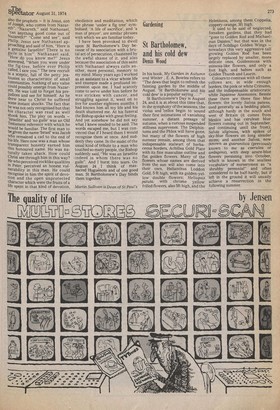R eli g io n
St Bartholomew, the unknown disciple
Martin Sullivan
Four hundred years ago, on the night of August 23-24, 1572 and the two following days, between 5,000 and 10,000 Huguenots were put to death in Paris and other large French cities, at the instigation of Catherine de Medici. She and her son believed that they could never uphold the authority of the Crown so long as the Huguenots shared political power in France. And so the massacre was planned. Its success was rendered possible by the knowledge that it would be approved by the authorities in Rome and that throughout Europe fervent Catholics would rejoice at its consummation. Vasari, the great painter, was summoned from Florence to commemorate the event by a painting on the wall of the Hall of Kings at the Vatican., Who then was Bartholomew, _ canonised arid honoured this month? Was he patron saint of the persecuted? No one knows. He was one of the twelve disciples, who like many others of that band, has disappeared without trace. Legends about this man abound, but facts are few. One possible clue remains. Bartholomew is often identified with Nathanael and if the two are one we can build up a recognisable identity-kit. Nathanael has a detailed reference in the New Testament. The next day Jesus decided to leave for Galilee; there He met Philip and told him, "Follow Me". Now Philip belonged to Bethsaida, the same town as Andrew and Peter; he met Nathanael and told him, "We have found Him whom Moses wrote about in the Law and Stator August 31, 1974 also the prophets — it is Jesus, son of Joseph, who comes from Nazareth''. "Nazareth," said Nathanael, "can anything good come out of Nazareth?" "Come and see", said Philip. Jesus saw Nathanael approaching and said of him, "Here is a genuine Israelite! There is no guile in him". Nathanael said, "How dp you know me?" Jesus answered, "When you were under the fig-tree, before ever Philip Called, I saw you." The new recruit is a sceptic, full of the petty jealousies so characteristic of small communities. Nothing of any value could possibly emerge from Nazareth. He was told to forget his prejudices and see for himself. As he drew near to Christ he suffered some instant shocks. The fact that he was not only recognised but that his character was read as well shook him. The play on words — Israelite' and `no guile' was an Old Testament reference with which he would be familiar. The first man to besiven the name 'Israel' was Jacob Who remained a cad to the end of his life. Here now was a man whose transparent honesty earned him this honoured name. He was naturally taken aback. How could Christ see through him in this way? He who perceived rocklike qualities in Peter, perceived an honest vulnerability in this man. He could recognise in him the spirit of devotion and the open unprotected Character which were the fruits of a life spent in that kind of devotion,
obedience and meditation, which the phrase 'under a fig tree' symbolised. 'A life of sacrifice', and 'a man of prayer', are similar phrases with which we are familiar today.
I have been provoked to dwell upon St Bartholomew's Day because of its association with a brutal act of persecution, chastened by the awful shame of it, and also because the association of this saint with Nathanael always calls another, more personal, memory to my mind. Many years ago I worked as an assistant to a vicar whose life and example made a profound impression upon me. I had scarcely come to serve under him before he was stricken with cancer, and struggling against it, went on to live for another eighteen months. I had known him all my life and his death shattered me. At his funeral the Bishop spoke with great feeling. And yet somehow he did not say what I knew needed to be said. The words escaped me, but I was convinced that if I heard them I would recognise them at once. And suddenly they came. In the midst of the usual kind of tribute to a man who touched so many people, the Bishop suddenly said,'"He was an Israelite 'indeed in whom there was no guile". And I burst into tears. On August 24 I think of massacred Huguenots and of one good man. St Bartholomew's Day binds them together.
Martin Sullivan is Dean of St Paul's



































 Previous page
Previous page